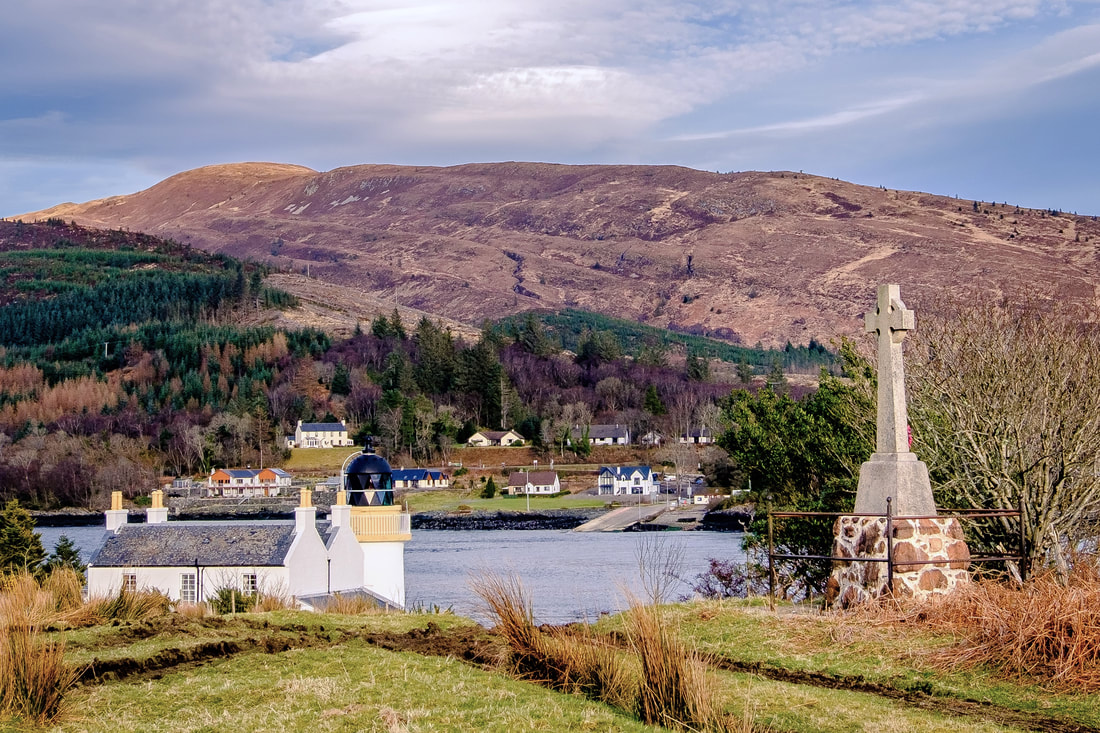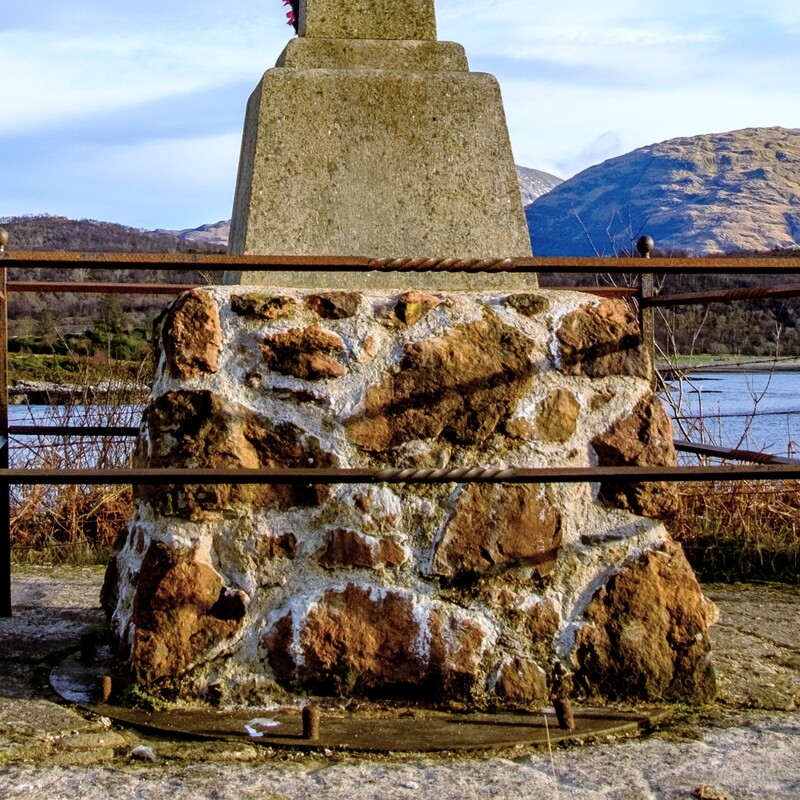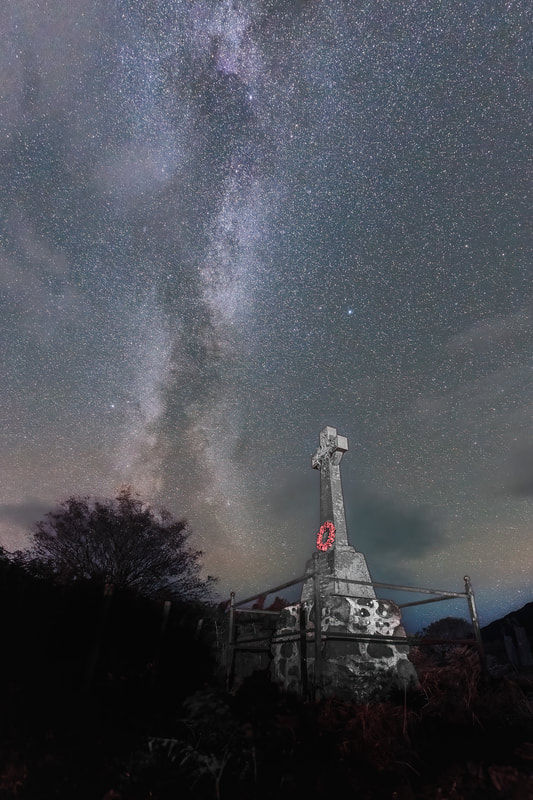|
I wonder how often folk have driven past the Ardgour War Memorial and never paid it much attention. This was certainly the case for me, having passed it countless times on my way to and from the Corran Ferry, until one day when I found myself with some spare time at the marshalling area on the Ardgour side of the Corran Narrows. After deciding to go for a quick walk, I found myself up on a bank just south of the lighthouse, standing beside the War Memorial and looking southwards at an expansive view of Loch Linnhe. While standing there, I spotted something that I would later learn played a small part in a huge project that is thought to have been key in bringing World War I to an end. The Ardgour War Memorial is typical of the many that you find scattered across the Highlands, consisting of a granite Celtic cross and plinth mounted on a base of what seems to be made of local stone. Whilst here, I took a moment to stand by it with my eye drawn to the wreath of red poppies that had been laid at the base of the cross and to the words inscribed on the plinth beneath it: IN MEMORIAM PARISH OF ARDGOUR THE GREAT WAR 1914-18 _____ DO'N GHINEALACH A RINN ÌOBAIRT SADH FHUILING CRUADAL, S A SHEALBHAICH BUAIDH _____ TO THE GENERATION WHICH BORE THE SACRIFICES AND BY SHARING IN THE HARDSHIPS, ACHIEVED VICTORY I then noticed that the Memorial’s stone base was sitting on what appeared to be a metal ring with several bolts protruding from it. I didn’t give them much thought at the time, but a day or two later, I couldn’t help wondering what they had been used for, so decided to try and found out.
The mines were being used in the North Sea Mine Barrage, a large minefield laid easterly from the Orkney Islands, right across the top of the North Sea to Norway with the aim of preventing the U-Boats based in Germany from making their way out into the Atlantic to attack the convoys that were bringing supplies from the United States to the British Isles.
I took these words for the image title from the seventh stanza of the poem, “For the Fallen” by Laurence Binyon, which reads:
“As the stars that shall be bright when we are dust, Moving in marches upon the heavenly plain, As the stars that are starry in the time of our darkness, To the end, to the end, they remain.” The poem is more commonly known for its third and fourth stanzas as they are often recited at Remembrance Day services as what is termed the "Ode of Remembrance", ending with the familiar words “We will remember them”. Despite the words of these two stanzas being extremely thought provoking, I find the words of the seventh stanza incredibly moving because there is such strong sense of poignancy to them. I guess that’s why I used them as the title for this image.
10 Comments
Michael Pittock
11/4/2023 19:59:19
Thank you for sharing this story there must be many more ready to be found and shared by those that stop for a moment and take time to look and find out as you did, as someone who spent many years as a shepherd in the Falklands and the way the war changed so many lives then and now I went out to build two monuments as a thank you for those that never came home but they are well remembered always
Reply
13/4/2023 15:06:46
Hi Michael,
Reply
Sherry Falconer Monson
11/4/2023 20:07:25
Steven, this is truly fascinating. Like you I've passed this so often without more than a fleeting thought. The IWM photos are remarkable. I'm taken the liberty of forwarding the article to all my family members concerned with this beautiful corner of our land.
Reply
Debbie Bott
12/4/2023 08:38:32
Fascinating, thank you, never knew any of it, having, like you, driven past many times over the years, and oh so saddening, beautiful words and provoking images.
Reply
Jacqueline
12/4/2023 18:20:40
This is so thought provoking. So brave. Especially with no shelter or camouflage.
Reply
Thank you for sharing the power of taking a moment to reflect on the sacrifices made during times of war. Your story of building two monuments as a thank you for those who never returned home is a touching tribute to those who gave their lives. It's important to remember the impact of war, not just on those who fought but also on the families and communities left behind. Your words remind us to never forget the sacrifices made for the freedoms we have today.
Reply
Your comment will be posted after it is approved.
Leave a Reply. |
AuthorHi, Archives
July 2024
Categories
All
|
Steven Marshall Photography, Rockpool House, Resipole, Strontian, Acharacle, PH36 4HX
Telephone: 01967 431 335 | Mobile: 07585 910 058 | Email: [email protected]
Telephone: 01967 431 335 | Mobile: 07585 910 058 | Email: [email protected]
All Images & Text Copyright © 2024 - Steven Marshall - All Rights Reserved




